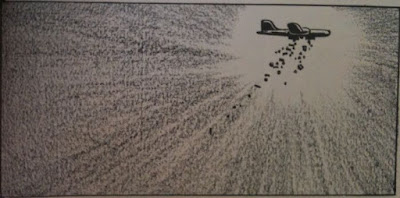And speaking of free stuff to read, the well-regarded first volume of Duncan the Wonder Dog is also available online, which is nice, since it is apparently almost completely sold out.
And why not some classic manga too? A blog called Black Sun is posting some of Shigeru Mizuki's GeGeGe No Kitaro stories, which is one of those series that people like me are always calling to be translated. This might be the best chance we have of reading it, at least for now.
Lucky in Love
Written by George Chieffet
Art by Stephen DeStephano

This is a pretty good book, following its titular Italian-American fellow as he grows up in Hoboken, goes off to war (although not combat; he's a mechanic in the Air Force), and returns home for some Best Years of Our Lives-style depression. It's all very well told, with realistic details coming through even when the art takes such a cartoony style, but being the first half of a two-volume series, it's somewhat incomplete, setting up themes that will presumably be dealt with later. Still, it's quite good.
However, there was one scene that I thought was excellent on its own and stood out in the memory the most. It's a dream sequence that Lucky has about the last hours of an acquaintance that died when his plane was lost at sea, and it takes a much more somber mood than the rest of the book, using some amazing charcoal-grey shading to emphasize death's inevitable approach. My favorite panel of all is this one:

That's the plane dumping extra weight in an attempt to stay aloft, and DeStephano manages to use the shading to give a sort of ironic twist to what looks like an action-packed war scene. That burst of lines radiating outward might normally signify the triumphant dropping of bombs, but this moody gray takes away that exciting blast and makes it a desperate action, and one that we know is doomed to failure.
The war experience seems to be central in Lucky's story, affecting his self-image as he returns home a hero even though he did nothing to deserve it, and that seems to be the message in this scene: heroic imagery twisted into something sad, as men slowly sink to a pointless death. War is hell, with effects reaching far outside and long beyond the actual conflict, and this scene manages to illustrate that rather effectively. Even if the rest of the two books surrounding it end up adding up to something less than great, this one is worth reading if only for this moment of striking darkness.

No comments:
Post a Comment